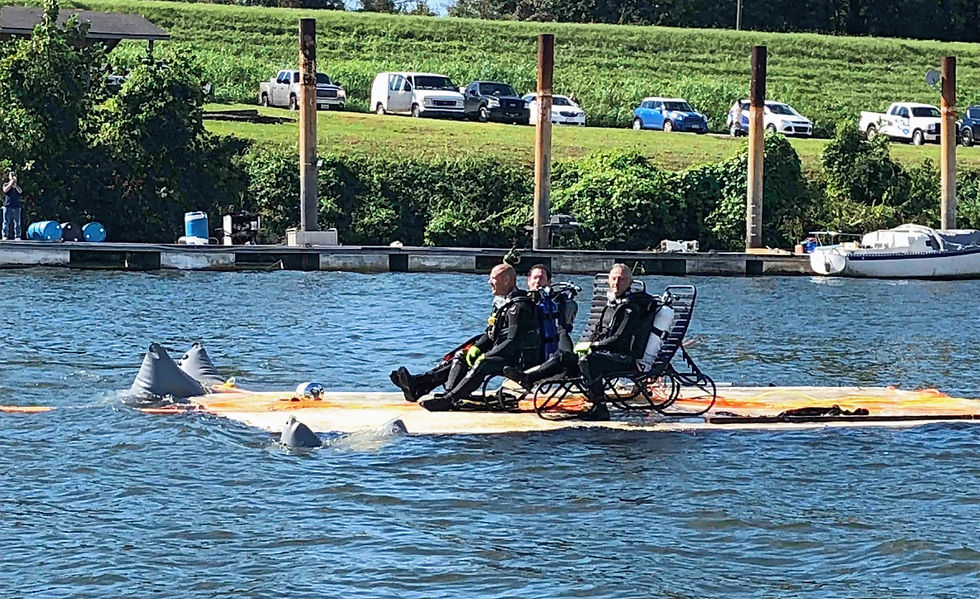The Master of Disaster
- Outdoors magazine

- Jun 4, 2024
- 4 min read
Tales of a tow boat captain
By Lynn Hobbs

A World War II vintage airplane, a 40-foot motorhome, a 68-foot houseboat – Captain Jon Gridley has salvaged these vehicles and more than 120 other boats and cars from the bottoms of Georgia’s lakes in his career.
“They’re all memorable, I can tell how I did every single one of them,” Capt. Gridley said. “It’s been an interesting ride. I wouldn’t trade it for anything.”

Gridley has been a licensed Coast Guard captain for 26 years, 10 of those with Sea Tow. He grew up on Lake Michigan, so being on the water has always been second nature to him. But making a living on the water in Wisconsin is not exactly a year-round job, so Gridley said he got a second job working in the iron industry. That is what eventually led him to Georgia.
He bought a boat and started a boat tow business at Clarks Hill Lake, got his Sea Tow franchise some time after that, then expanded -- first to Lake Oconee, then Sinclair and Allatoona. Today, his business operates seven boats and he also owns a boat dealership at Clarks Hill.
Memorial Day through Labor Day, his business gets about 8-10 calls a day per lake, usually from boaters who have run out of gas or their boat motor quit. The calls continue in the winter, although not at the same high volume.

Lakes Oconee and Sinclair have a different type of stranded boater than the other lakes, the captain noted.
“The Georgia Power tide cycle generates a lot of calls,” he said, referring to the electric company’s frequent transfer of water back and forth between the two lakes to generate hydroelectricity. The transfer causes the water level to fluctuate as much as 18 inches.
“We get calls that a boat has run aground at one lake, while one has floated off dock at the other lake,” Gridley said. “Also, people don’t realize they can go under a bridge while the water is low, but when the water rises, they can’t go back under it, so they get stuck on the wrong side of the bridge. It’s a lot of fun. Every time, every phone message, every situation is unique. It’s never boring.”
“Unique” was an understatement last summer when DNR called Captain and told him they had a plane under 35 feet of water in Clarks Hill Lake. A military soldier had purchased a vintage WWII Sinton Sentinel Air Ambulance, the type that hauls two patients, Gridley said. While the soldier was flying, the Sinton’s engine froze.
“So he decided he was either going down in the trees or the lake, and he ditched it in the lake,” Gridley recounted. “He was able to get out of the plane and a pontoon boat saw him and plucked him out of the water, so he was okay. … I got the plane up the next day.”

According to Gridley’s experiences, Clarks Hill seems to be the “unique” zone. Four months before the vintage plane incident, the Army Corp of Engineers called him to get a 40-ft. motorhome out of the lake.
“I’m like, ‘okay, what bridge did it go off?’ because they’re always calling me when cars go off bridges; but no, it went down a boat ramp,” he said, laughing. “The woman was drunk and she probably hit that boat ramp at 65 mph in the middle of the night and it floated out a quarter mile. She was able to get out – she slept in an outhouse there at the lake. It was a big, fancy motor coach. The next day, it was sticking out about that far (he spread his hands about 8-inches apart). Yeah, that was interesting,” he added of the salvage job.
A 68-ft. houseboat overturned, 35 boats docked at a marina that were hit by a microburst -- his stories of Clarks Hill adventures continued. Regarding lakes Oconee or Sinclair, the rescues seemed much more normal in comparison, although not at all normal for the owners of the vessels. “When they call us, it’s their emergency and it feels good to help remedy their situation,” Gridley said. “That’s the best part of the job – helping people.”

On Dec. 31 on Lake Sinclair, a brand new pontoon boat just quit, he said. Other pontoons on Sinclair and Oconee have flipped over; and a microburst took an entire dock and flipped it with the boat still in the slip, he said. Capsized pontoons are “no fun” to work with, Gridley said, “Sometimes we have to use the boom truck, but most of the time, I can flip it over with the Sea Tow boats. It tests your brain, you almost have to turn into an engineer. I am thankful I’ve got great captains and divers.”
Captains Doug and Jason Nelms and Teddy Jahns and diver Scott Sears know how to tow and salvage boats safely and economically while protecting the boat, Gidley said, “because we are working with insurance companies who want it in one piece.”
In addition to being licensed boat captains, Gridley and Jahns are certified mechanics so they can trouble-shoot on the water or by phone. “A lot of times, they just have it in neutral or the kill switch is on,” Gridley said.
The company uses air bags, compressors, and pumps for their rescues, Gridley said, noting they have 120,000 pounds of lift capacity.
~ ~ ~ ~ ~ ~ ~ ~
This story first appeared in the 2019 edition of Lake Country Boating magazine, which is owned by Smith Communications, Inc. No portions of the story or photos may be copied or used without written consent from the publisher.







Comments